Employment Verification Background Checks Essentials Guide

What is an Employment Verification Background Check?
Employment verification background checks are essential tools for employers in today’s hiring landscape. These checks validate the professional history of job applicants, ensuring that the information they provide about their previous employment is accurate and reliable. With workplace integrity and organizational success often hinging on hiring the right candidate, employment verification has become a critical step in safeguarding businesses and fostering transparency.
What is an Employment Verification Background Check?
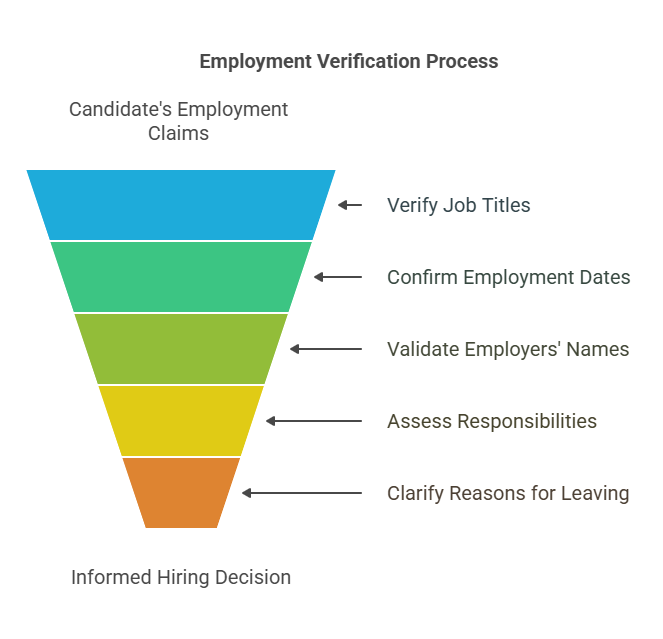
An employment verification background check is the process through which an employer confirms details about a candidate’s past jobs. The goal is to verify key information such as:
- Job Titles: Ensuring accuracy in the candidate’s claimed role(s).
- Dates of Employment: Confirming the timeline of their employment history.
- Employers’ Names: Verifying the legitimacy of the companies listed.
- Responsibilities: Assessing whether the duties and skills match the job description.
- Reasons for Leaving: Clarifying whether the departure was voluntary or due to termination.
This process provides employers with a clear picture of a candidate’s professional history, helping them make informed hiring decisions. It also allows candidates to showcase their legitimacy and trustworthiness in a competitive job market.
Purpose of Employment Verification
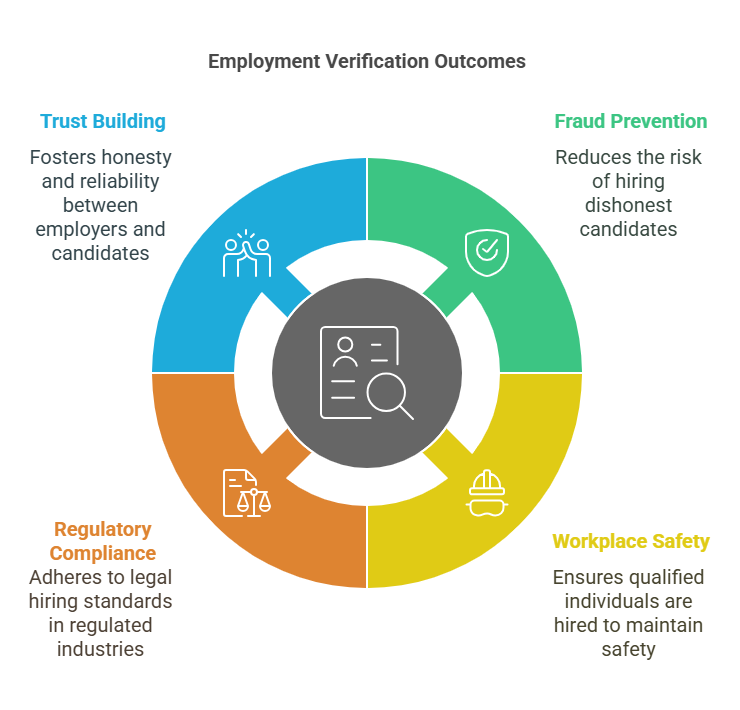
1. Protecting Businesses from Fraud
Resume inaccuracies are more common than many realize. A study by CareerBuilder found that 58% of employers have caught candidates lying on their resumes. Employment verification helps uncover embellishments or falsehoods in work history, such as inflated job titles, exaggerated responsibilities, or fabricated employment periods.
2. Ensuring Workplace Safety and Integrity
Hiring someone with false credentials can jeopardize workplace safety, productivity, and morale. For example, in industries like healthcare or finance, hiring unqualified individuals could lead to catastrophic errors or breaches of trust. Employment verification minimizes these risks by ensuring the candidate meets the necessary qualifications.
3. Regulatory Compliance in Certain Industries
In regulated industries, such as healthcare, education, and government, employment verification is often legally mandated. Employers must adhere to strict hiring standards to avoid legal issues and ensure compliance with federal, state, and industry regulations.
4. Building Trust and Transparency
For candidates, the process demonstrates honesty and reliability, two qualities that employers highly value. For employers, it shows a commitment to fair and diligent hiring practices, fostering trust between both parties.
Why is Employment Verification Important?
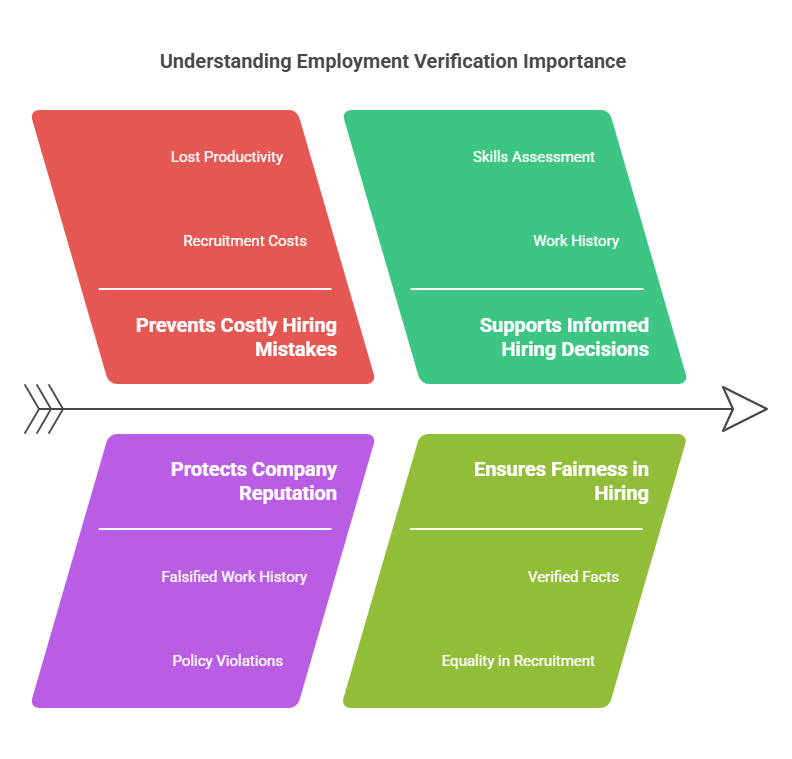
Employment verification serves a dual purpose: protecting employers from potential risks and providing employees with a fair opportunity to showcase their qualifications. Below are some of the key reasons why employment verification is critical:
- Prevents Costly Hiring Mistakes
Making a poor hiring decision can be expensive. Studies estimate that the cost of a bad hire can range from $4,000 to $15,000 when considering recruitment costs, lost productivity, and potential turnover. Employment verification reduces this risk by confirming a candidate’s credentials upfront. - Protects Company Reputation
Hiring someone who has falsified their work history can harm a company’s reputation, especially if the new hire fails to perform or violates workplace policies. By verifying employment details, organizations can protect their credibility and reputation. - Supports Informed Hiring Decisions
Employment verification provides employers with the information they need to assess a candidate’s fit for a role. Understanding a candidate’s work history, skills, and responsibilities allows hiring managers to make more informed decisions. - Ensures Fairness in Hiring
For candidates, the process ensures that hiring decisions are based on verified facts, promoting fairness and equality in the recruitment process.
Industries Where Employment Verification is Most Critical
While employment verification is valuable across all industries, some sectors rely on it more heavily due to the sensitive or high-stakes nature of their work:
| Industry | Importance of Employment Verification |
|---|---|
| Healthcare | Ensures that medical professionals have the necessary qualifications and licenses. |
| Finance | Protects against fraud and ensures candidates can handle sensitive financial information. |
| Education | Verifies the credentials of educators and administrators to maintain high standards. |
| Government | Confirms eligibility for roles involving security clearances or public trust. |
| Technology | Assesses the technical expertise of candidates for specialized roles. |
Each of these industries faces unique challenges, making employment verification a non-negotiable step in the hiring process.
Components Verified During Employment Checks
Employment verification typically involves confirming a range of details about a candidate’s professional history. Below is an overview of the common components that employers examine during these checks:
| Component | Details Verified |
|---|---|
| Job Titles | Verifies the accuracy of the candidate’s listed titles. |
| Dates of Employment | Confirms the start and end dates of each job. |
| Employer Information | Checks the legitimacy of the employer and confirms the candidate’s association. |
| Job Responsibilities | Validates that the candidate performed the listed duties. |
| Reasons for Leaving | Investigates whether the candidate resigned, was terminated, or left for other reasons. |
| References | Contacts supervisors or colleagues for insights into the candidate’s performance. |
These components collectively provide a comprehensive picture of a candidate’s work history, ensuring that employers have all the information needed to evaluate their suitability for the role.
How Employers Use Employment Verification
Employers utilize employment verification to:
- Confirm Candidate Claims: Ensuring that the information provided on resumes and applications is truthful.
- Assess Fit for the Role: Reviewing responsibilities and tenure to evaluate whether the candidate’s experience aligns with job requirements.
- Identify Discrepancies: Spotting gaps, inaccuracies, or inconsistencies in work history.
- Meet Compliance Requirements: Satisfying industry regulations and legal obligations related to hiring practices.
In addition to benefiting employers, the process allows candidates to correct inaccuracies or omissions in their records, ensuring they are represented accurately.
Challenges in Employment Verification
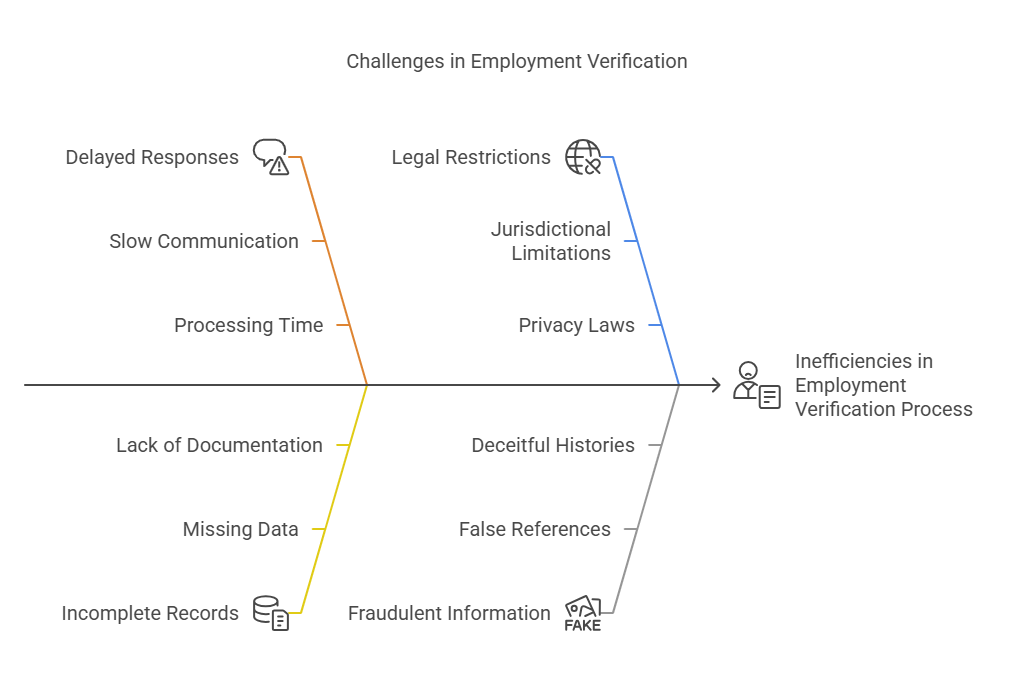
While employment verification is a valuable tool, it is not without challenges. Some of the common obstacles include:
- Delayed Responses from Previous Employers
Former employers may take time to respond to verification requests, delaying the hiring process. - Incomplete Records
Some employers may not keep detailed records of former employees, leading to gaps in verification. - Legal Restrictions on Information Sharing
Certain jurisdictions limit the type of information employers can disclose about former employees, which can complicate verification efforts. - Fraudulent Information
In rare cases, candidates may provide false references or fabricated work histories, requiring employers to be vigilant.
Despite these challenges, employment verification remains a critical step in ensuring successful hiring outcomes.
Employment verification background checks play a vital role in modern hiring practices. They provide employers with the tools to make informed decisions while offering candidates the opportunity to demonstrate their qualifications and build trust. By understanding what employment verification entails and why it matters, both employers and job seekers can approach the process with confidence.
How Does the Employment Verification Process Work?
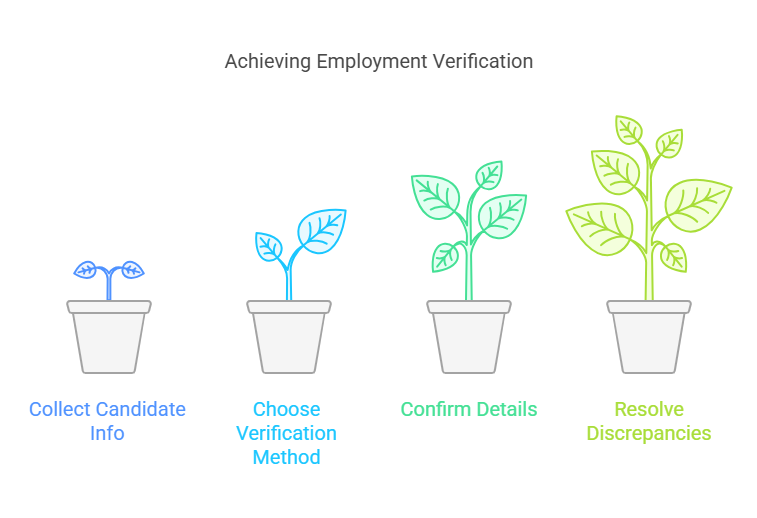
The employment verification process is a structured approach designed to confirm a candidate’s professional history. Employers rely on this process to ensure they make informed hiring decisions, minimizing risks and fostering workplace integrity. In this part, we’ll explore the detailed steps involved in employment verification, the challenges that may arise, and the benefits of using reliable services like Exact Background Checks.
Step-by-Step Guide to Employment Verification
The employment verification process can vary depending on the employer’s specific needs and resources, but it generally follows these core steps:
1. Collecting Information from the Candidate
Before initiating the verification process, employers gather relevant information from the candidate. This includes:
- Resumes and Job Applications: These documents provide the foundation for the verification process by listing the candidate’s previous employers, job titles, and employment dates.
- References: Candidates may be asked to provide contact information for supervisors or colleagues who can vouch for their work experience.
- Consent Forms: Employers must obtain written consent from the candidate to conduct an employment verification background check, as required by the Fair Credit Reporting Act (FCRA) and other regulations.
Key Tip for Candidates: Ensure your resume and application are accurate and up-to-date. Double-check the details of your employment history to avoid discrepancies during verification.
2. Choosing a Verification Method
Employers can verify employment details through several methods, depending on their resources and the level of detail required:
- Direct Contact with Previous Employers:
- Employers may call or email the candidate’s former employers to confirm work history.
- Typical questions include:
- Did the candidate work at your organization?
- What were their dates of employment?
- What was their job title and role?
- Would you rehire this individual?
- Third-Party Verification Services:
- Companies like Exact Background Checks specialize in conducting thorough and compliant employment verifications.
- These services are especially useful for organizations with limited HR resources or when verifying candidates with extensive work histories.
- Automated Databases:
- Employers may use databases like The Work Number, which store employment records from participating organizations.
3. Confirming Job Titles, Responsibilities, and Employment Dates
The most critical aspects of employment verification include:
- Job Titles: Verifying that the candidate held the position(s) they claim.
- Responsibilities: Ensuring the candidate performed the duties associated with the role.
- Employment Dates: Confirming start and end dates to detect any gaps or overlaps in employment.
Why It Matters: These details help employers assess whether the candidate’s skills and experience align with the job requirements.
4. Resolving Discrepancies or Incomplete Records
During the verification process, employers may encounter inconsistencies or missing information. Common issues include:
- Mismatched Job Titles: A candidate may have inflated their title (e.g., listing “Manager” instead of “Assistant Manager”).
- Inaccurate Employment Dates: Dates may be exaggerated to cover gaps in employment.
- Unresponsive Employers: Former employers may fail to respond to verification requests due to outdated contact information or company policies.
Steps to Resolve Issues:
- Reach out to the candidate for clarification or additional documentation.
- Use third-party services to track down hard-to-reach employers.
- Document all verification attempts to ensure compliance with legal requirements.
Challenges in Employment Verification
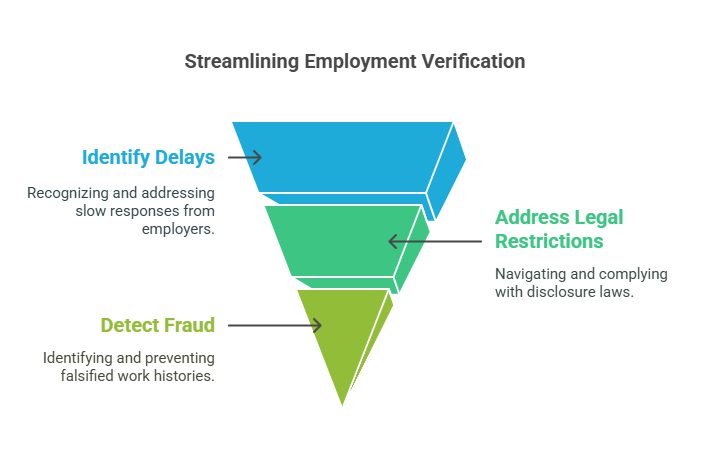
While employment verification is straightforward in theory, several challenges can complicate the process:
1. Delayed Responses
One of the most common challenges is delayed responses from previous employers. Reasons for delays include:
- Former employers being overwhelmed with requests.
- Outdated contact information for HR departments.
- Organizations that have closed or merged with other companies.
Solution: Third-party verification services like Exact Background Checks can streamline the process by leveraging established networks and resources.
2. Privacy and Legal Restrictions
In some jurisdictions, laws limit the type of information that former employers can disclose. For instance:
- Employers may only confirm employment dates and job titles, avoiding comments on performance or reasons for leaving.
- Providing false information or defamation claims can lead to legal risks for former employers.
Solution: Employers should familiarize themselves with local laws and work with compliant verification providers.
3. Fraudulent Information
Candidates may attempt to falsify their work history by:
- Providing fake references or contact information.
- Listing companies that do not exist.
Solution: Using reputable services like Exact Background Checks helps detect and prevent fraud by conducting thorough verifications.
Importance of Reliable Employment Verification Services
With the complexities involved in employment verification, employers often turn to professional services to ensure accuracy and efficiency. Here’s how providers like Exact Background Checks add value:
1. Accuracy and Reliability
Professional services use advanced tools and trained professionals to verify employment details accurately. They have access to databases and networks that make it easier to verify hard-to-reach records.
2. Compliance with Legal Standards
Compliance with laws like the FCRA is critical during background checks. Reliable services ensure:
- Candidate consent is obtained before verification.
- The process adheres to privacy laws and anti-discrimination guidelines.
3. Time and Resource Efficiency
For busy HR departments, employment verification can be time-consuming. Outsourcing to a trusted provider like Exact Background Checks allows employers to focus on other critical hiring tasks.
Benefits of Transparency and Accuracy
For Employers:
- Reduces the risk of hiring unqualified candidates.
- Protects the organization’s reputation and workplace integrity.
For Candidates:
- Promotes trust by demonstrating honesty and professionalism.
- Prevents misunderstandings that could jeopardize job offers.
The Role of Exact Background Checks
Exact Background Checks stands out as a leader in employment verification services. With a commitment to accuracy, compliance, and efficiency, they offer tailored solutions to meet the unique needs of employers and job seekers alike. Key features include:
- Comprehensive Verification: Covering all aspects of employment history, including job titles, responsibilities, and tenure.
- Fast Turnaround Times: Ensuring results are delivered quickly without compromising accuracy.
- Dedicated Support: Providing guidance to employers and candidates throughout the process.
By partnering with Exact Background Checks, employers can enhance their hiring processes and ensure they make the best decisions for their teams.
Tips for Employers and Candidates
For Employers:
- Choose reputable verification services to ensure accuracy and compliance.
- Communicate clearly with candidates about the verification process and timeline.
- Document all steps to protect against legal risks.
For Candidates:
- Be honest about your work history and provide accurate information.
- Respond promptly to requests for additional documentation.
- Review your employment history for potential discrepancies before applying for jobs.



